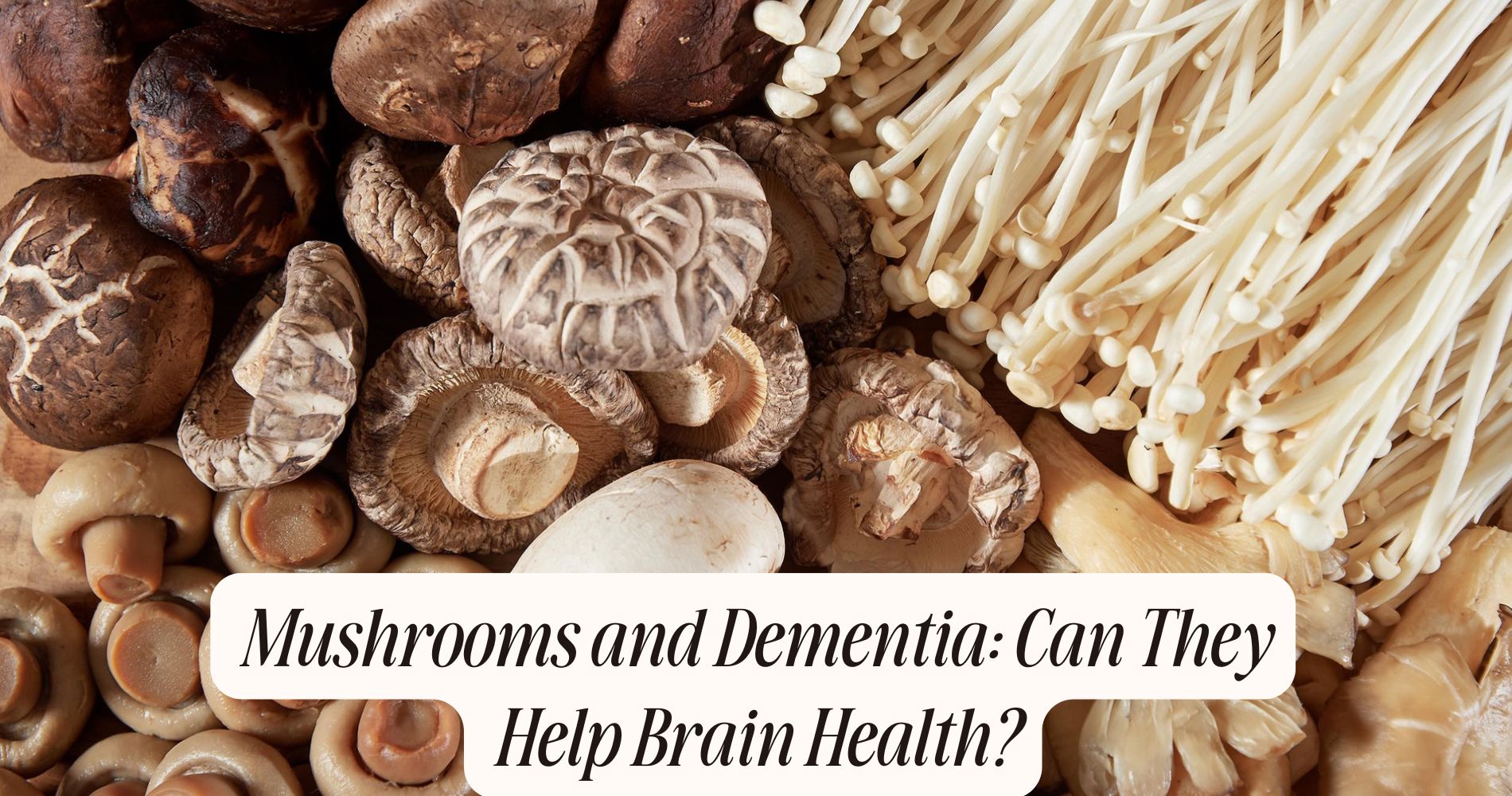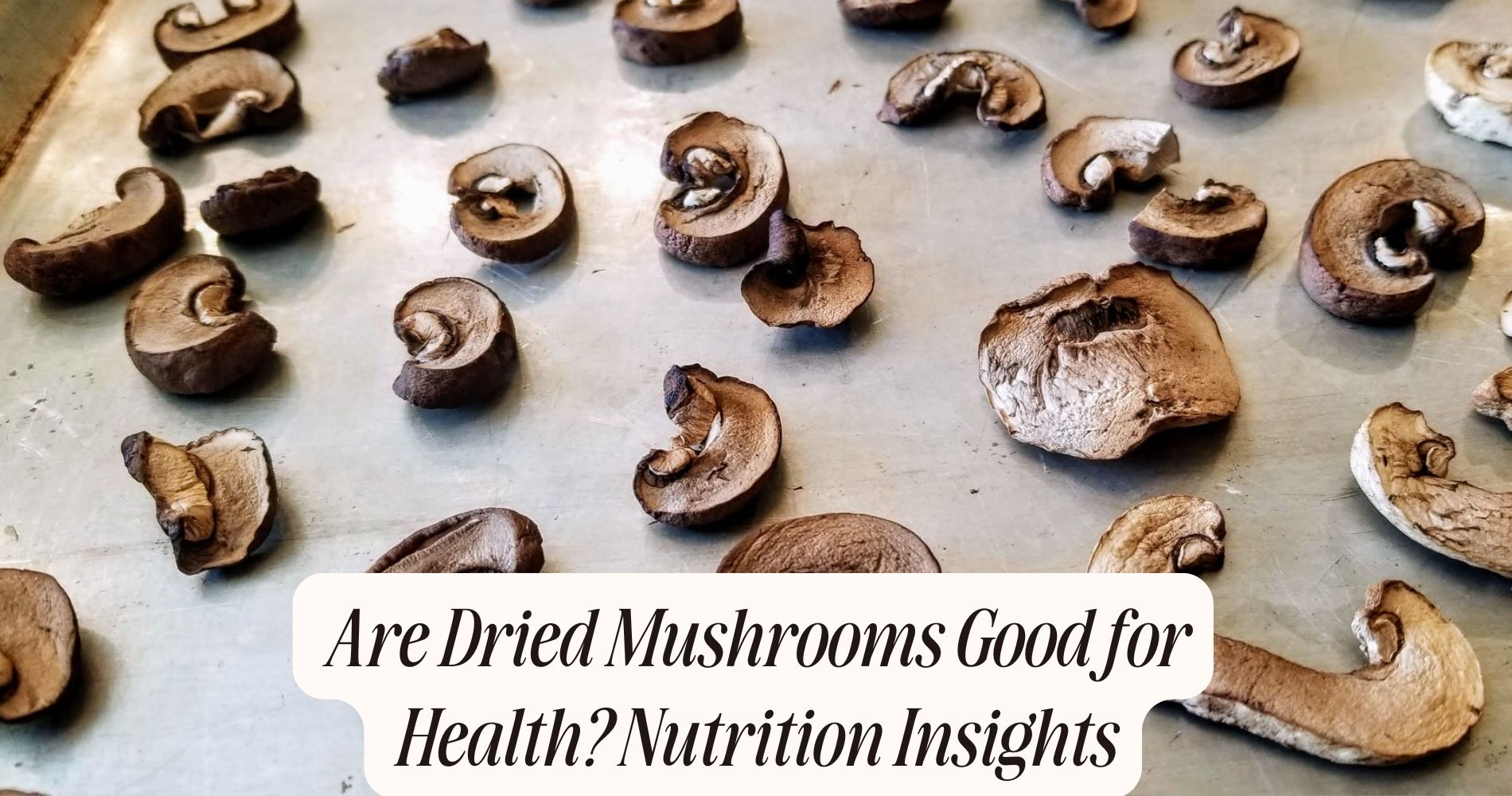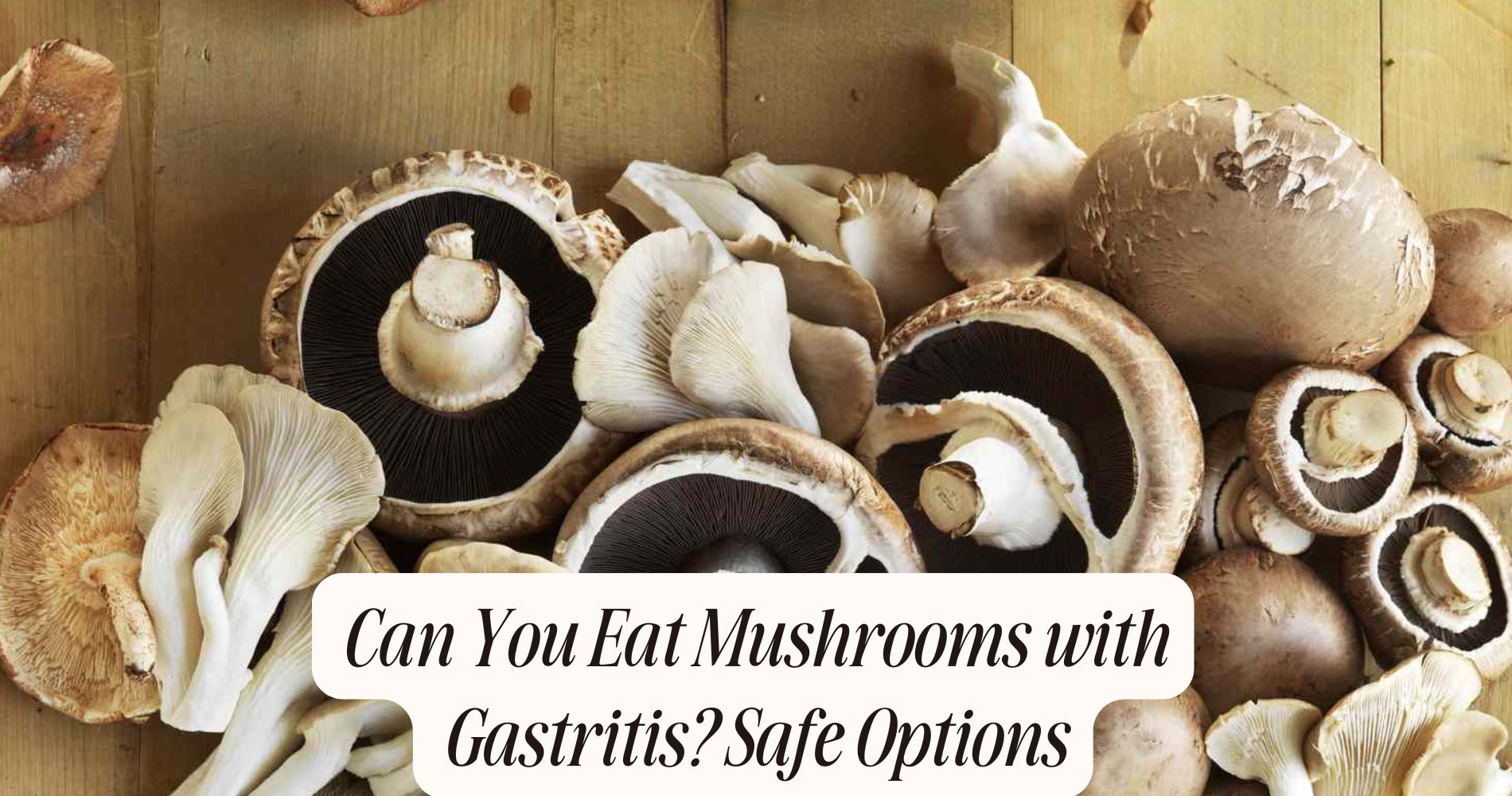
Mushrooms and Dementia: Can They Help Brain Health?
Overview of Dementia
Dementia refers to a group of symptoms affecting memory, thinking, and social abilities severely enough to interfere with daily life. It's not a single disease but rather an umbrella term for various conditions, including Alzheimer's disease.
As you navigate the challenges that come with dementia, understanding its symptoms is imperative for effective symptom management. Memory loss, confusion, and difficulty with communication can disrupt daily routines not just for those diagnosed but also for their caregivers.
Caregiver support plays an essential role in this journey. When you're caring for someone with dementia, you might feel overwhelmed at times. Seeking assistance from support groups and resources can greatly lighten your load. Connecting with others facing similar challenges can provide emotional relief and practical advice.
Implementing structured routines and engaging activities can aid in symptom management, making daily life smoother for both you and your loved one.
Nutritional Benefits of Mushrooms
Incorporating mushrooms into your diet can offer numerous nutritional benefits that may support brain health and overall well-being. Rich in antioxidants, mushrooms help combat oxidative stress, which can be particularly harmful to brain cells.
They also contain essential vitamins like B vitamins, which play an important role in energy production and cognitive function.
Different mushroom varieties, such as shiitake, maitake, and portobello, provide unique flavors and textures that can enhance your culinary uses. You can sauté them, add them to soups, or toss them in salads, making it easy to include these nutritious fungi in your meals.

Mushrooms also contain minerals like selenium and copper, both of which are essential for maintaining proper brain function.
Plus, they're low in calories and high in fiber, supporting a healthy weight and digestive system.
Key Mushroom Varieties
When you're exploring mushrooms that may impact brain health, you can't overlook Lion's Mane, known for its potential cognitive benefits.
Reishi is another variety that helps with stress relief, making it a great choice for overall wellness.
And let's not forget Shiitake, packed with nutrients that support your body's functions.
Lion's Mane Benefits
Lion's Mane mushrooms are gaining attention not just for their unique appearance but also for their potential cognitive benefits. You might find it fascinating that these mushrooms are linked to cognitive enhancement, making them a popular choice for those seeking to boost brain function.
Studies suggest that Lion's Mane can stimulate the production of nerve growth factor (NGF), which plays an essential role in neurogenesis promotion—the process of generating new neurons in the brain.
By incorporating Lion's Mane into your diet or supplement routine, you could potentially experience improvements in memory, focus, and overall mental clarity. Many people report feeling sharper and more alert after using this mushroom.
Plus, it's relatively easy to add to your meals, whether in tea, capsules, or cooked dishes.

The benefits of Lion's Mane extend beyond just cognitive enhancement. It also has anti-inflammatory and antioxidant properties, which can support overall brain health.
If you're looking for natural ways to boost your cognitive function, considering Lion's Mane might be a wise choice. As research continues to unfold, you might just find that this unique mushroom has a lot to offer for your brain health.
Reishi for Stress Relief
Reishi mushrooms, often dubbed the "mushroom of immortality," have been revered in traditional medicine for their remarkable ability to combat stress and promote relaxation. If you're feeling overwhelmed or anxious, incorporating reishi into your routine might be a game-changer for you.
Known for their adaptogenic properties, reishi mushrooms help your body adapt to stress and maintain balance. One of the standout reishi benefits is its ability to lower cortisol levels, the hormone primarily responsible for stress.

By consuming reishi, whether in powder form, capsules, or tea, you can potentially experience a calming effect that makes daily challenges feel more manageable. Many people report feeling a sense of tranquility and improved mood after integrating reishi into their lifestyle.
Additionally, reishi can enhance sleep quality, which is essential for effective stress reduction. A good night's sleep helps you recharge and prepares you to face the next day with renewed energy.
Shiitake Nutritional Value
Mushrooms are a diverse group of fungi that not only offer various health benefits but also pack a punch regarding nutritional value. Shiitake mushrooms, in particular, are a fantastic choice if you're looking to boost your diet. They're low in calories yet rich in essential nutrients.
A one-cup serving of cooked shiitake provides about 81 calories, along with significant amounts of fiber, protein, and various vitamins and minerals.
One of the key shiitake benefits is their high content of polysaccharides, which can support your immune system. They're also a great source of vitamin D, especially when exposed to sunlight.
Including shiitake in your meals isn't just nutritious; it's also versatile. You can toss them into stir-fries, soups, or even pasta dishes. Try shiitake recipes like a savory shiitake stir-fry with vegetables or a creamy shiitake risotto to enjoy their unique flavor and nutritional perks.
Incorporating shiitake mushrooms into your diet can contribute to overall health and well-being, making them a smart addition to your kitchen.
Bioactive Compounds in Mushrooms
When you explore the bioactive compounds in mushrooms, you'll discover their impressive nutritional benefits.
These compounds not only boost your overall health but also provide powerful antioxidants that can help protect your brain.
Understanding how these elements work together could be key in the fight against dementia.
Nutritional Benefits of Mushrooms
Have you ever wondered what makes mushrooms a powerhouse of nutritional benefits? These versatile fungi come in various mushroom varieties, each with unique nutritional profiles that contribute to your overall health.
Whether you enjoy shiitake, portobello, or button mushrooms, they offer an array of culinary uses, enhancing flavors in countless dishes.
Mushrooms are low in calories but rich in essential nutrients like vitamins B and D, minerals, and fiber. Their health benefits extend beyond basic nutrition; they play a significant role as dietary sources of antioxidants and compounds that support immune function.
Incorporating mushrooms into your meals can boost your immune support and promote overall well-being.
You can experiment with different cooking methods, such as sautéing, grilling, or roasting, to bring out the best in these ingredients. Not only do they add depth and flavor enhancement to your recipes, but they also provide a satisfying texture.
Antioxidants and Neuroprotection
The remarkable potential of bioactive compounds in mushrooms offers promising avenues for neuroprotection, especially through their rich antioxidant properties. These compounds work by scavenging free radicals, which are harmful molecules that can damage brain cells and contribute to neurodegenerative diseases. By incorporating mushrooms into your diet, you're not just enjoying their unique flavors; you're also supporting your brain health.
Research has shown that certain mushrooms, like Lion's Mane and Reishi, possess significant antioxidant properties that may enhance your body's ability to combat oxidative stress. This stress is a key factor in the progression of dementia and other cognitive disorders. The neuroprotective effects of these mushrooms could help shield your brain from age-related decline.

You might consider adding a variety of mushrooms to your meals, whether sautéed, in soups, or as supplements. Regular consumption could provide the antioxidants needed to maintain cognitive function and protect your neurons.
Essentially, integrating mushrooms into your diet could be a delicious and effective strategy for promoting brain health and potentially warding off dementia. So, why not explore the rich world of mushrooms and their benefits for your cognitive well-being?
Research on Mushrooms and Brain Health
Recent studies suggest that certain mushrooms might play a significant role in promoting brain health and potentially reducing the risk of dementia. Researchers have been focusing on various mushroom compounds, particularly those found in varieties like lion's mane and shiitake.
These compounds are believed to enhance cognitive function, which could be essential as you age. In clinical trials, participants who incorporated specific mushrooms into their diets showed improvements in memory and overall cognitive performance.
These mushrooms contain bioactive substances that may stimulate nerve growth and repair, lending support to your brain's neural networks. It's exciting to think that adding mushrooms to your meals could offer a tasty way to boost your brainpower.
Moreover, the antioxidant properties of these mushrooms help combat oxidative stress, a factor linked to cognitive decline. With ongoing research, scientists are uncovering the potential of mushrooms as a natural approach to cognitive enhancement.
While more studies are needed to fully understand their impact, incorporating these nutrient-rich fungi into your diet could be a smart move for your brain health. So, consider getting creative in the kitchen with mushrooms and enjoy their benefits!
Mechanisms of Action
Certain compounds found in mushrooms, like lion's mane and shiitake, interact with your brain's biology in fascinating ways.
Lion's mane, for example, contains hericenones and erinacines, which promote the production of nerve growth factor (NGF). This protein is essential for the survival and maintenance of neurons, contributing to its neuroprotective properties. By supporting neuron health, lion's mane may help prevent cognitive decline.
Shiitake mushrooms, on the other hand, are rich in polysaccharides and antioxidants, which can reduce inflammation and oxidative stress in the brain. This inflammation reduction is important, as chronic inflammation is linked to neurodegenerative diseases, including dementia.
Together, these compounds not only protect your brain but also enhance cognitive function. The combination of these mechanisms leads to cognitive enhancement, making it easier for you to focus, learn, and remember information.
Incorporating Mushrooms Into Your Diet
Adding mushrooms to your meals is an easy way to harness their cognitive benefits. You can start by incorporating a variety of mushrooms, such as shiitake, portobello, and cremini, into your daily diet. These flavorful fungi can enhance not only the taste but also the nutritional value of your dishes.
Try exploring simple mushroom recipes that fit seamlessly into your routine. For breakfast, sauté mushrooms with spinach and eggs for a hearty start to your day. At lunch, toss some sliced mushrooms into a salad or blend them into a creamy soup. For dinner, consider adding mushrooms to stir-fries, pasta, or even as a pizza topping.

When it comes to dietary tips, remember that cooking mushrooms can enhance their flavor and make nutrients more bioavailable. You might also want to experiment with dried mushrooms, which can be rehydrated and added to a variety of meals.
Ultimately, the key is to be creative and consistent. The more you include mushrooms in your meals, the more you can enjoy their potential brain health benefits while savoring delicious flavors.
Potential Risks and Considerations
When incorporating mushrooms into your diet, it's important to keep a few potential risks in mind. First, reflect on the risk factors associated with specific types of mushrooms. Some wild mushrooms can be toxic and pose serious health threats, so always verify you're consuming safe varieties.
Dosage evaluations are also essential. While mushrooms may offer health benefits, consuming them in excessive amounts can lead to side effects such as gastrointestinal discomfort or nausea. It's wise to start with small servings to gauge how your body reacts.
Be mindful of allergic reactions, as some individuals may have sensitivities to certain mushroom species. If you notice any unusual symptoms after eating mushrooms, it's best to consult a healthcare professional.
Interaction potential is another factor to reflect on, especially if you're on medication. Certain mushrooms can interact with drugs, affecting their efficacy or leading to unwanted side effects.
Finally, the long-term effects of regular mushroom consumption are still not fully understood, so it's beneficial to stay informed and monitor your health. By being aware of these considerations, you can enjoy the potential benefits of mushrooms while minimizing risks.
Future Directions in Research
Research into the health benefits of mushrooms, especially regarding dementia, is expanding rapidly. Future studies will likely focus on dietary interventions that incorporate various mushroom species and their potential neuroprotective properties.
You'll see more research collaborations among universities, hospitals, and the private sector, which can enhance the scope of investigations. These partnerships can lead to innovative methodologies that yield more reliable results.
Clinical trials are vital for validating the efficacy of mushrooms in supporting brain health. Funding opportunities from both government and private organizations are important to support these initiatives.
As researchers conduct data analysis, they'll uncover patterns that could inform public health initiatives aimed at raising awareness about the benefits of mushrooms for cognitive health.
Awareness campaigns will help promote understanding of how mushrooms can be integrated into daily diets, encouraging healthier lifestyle choices.
Furthermore, interdisciplinary approaches will bring together nutritionists, neurologists, and mycologists to create thorough strategies for tackling dementia.
Frequently Asked Questions
Can Mushrooms Interact With Dementia Medications?
Mushrooms can interact with dementia medications, potentially altering medication effects. You should consult your healthcare provider before combining them, ensuring you understand any risks and benefits associated with mushroom interactions and your specific treatment plan.
Are Certain Mushrooms Safer for Dementia Patients?
When considering mushroom varieties, you'll find some safer for dementia patients. Research suggests certain mushrooms may offer cognitive benefits, but always consult a healthcare professional before introducing any new foods into their diet.
How Do Cooking Methods Affect Mushroom Nutrients?
Cooking methods greatly impact nutrient preservation in mushrooms. When you sauté, steam, or roast them, you can enhance flavors while retaining essential vitamins. Avoid boiling, as it often leaches valuable nutrients into the water.
Can Mushrooms Cause Allergic Reactions in Some Individuals?
Yes, mushrooms can cause allergic reactions in some individuals. If you're sensitive, your immune response may trigger symptoms like itching or swelling. It's crucial to recognize mushroom allergies and consult a professional if you experience reactions.
What Are the Best Ways to Store Mushrooms?
To store mushrooms effectively, use proper mushroom preservation techniques. Keep them in a paper bag in the fridge for ideal storage conditions, avoiding plastic, which can trap moisture and lead to spoilage.
Conclusion
Incorporating mushrooms into your diet might just be a tasty way to support brain health and potentially reduce dementia risk. With their rich nutritional profile and bioactive compounds, various mushroom varieties could offer protective benefits for your brain. As research continues to unfold, staying informed can help you make the best choices for your health. So, why not explore different mushrooms in your meals and see how they can fit into your daily routine?




